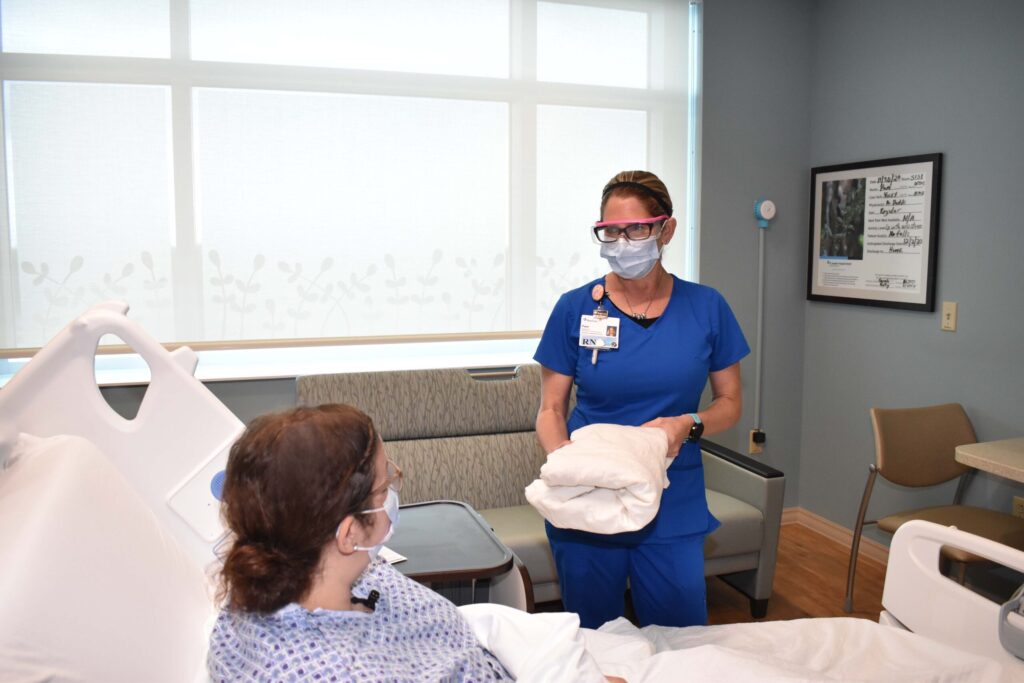BayCare to Implement Virtual Health Care Assistant in Hospital Rooms
by TIM CRAIG
“Alexa, can you turn on the television and bring me my medication?”
As smart speakers with digital assistants like Amazon’s Alexa or Apple’s Siri continue to become a growing part of everyday life, incorporating that technology at the hospital seems like a natural step.
That’s exactly what BayCare has done. The company announced recently that after two successful trials, it will utilize smart technology in 2,500 hospital rooms across its 14 Tampa Bay-area hospitals over the next 12 months. Once the technology is installed, according to the company, patients will experience smart rooms that allow them to connect with their care team and control the television and other devices — all hands-free.
“The patient can simply ask the virtual assistant for things they need like a blanket or a glass of water,” says Craig Anderson, BayCare director of innovation. The health-care specific platform known as Aiva interprets those requests and sends them to the right person.
“It is a seamless connection between the patient and their care team,” Anderson says.
Anderson says he learned of Aiva through industry groups as early as 2018. He was familiar with one of the designers and knew that Aiva could help BayCare meet patient and care team needs. The technology was developed, in part, through the Cedars-Sinai Accelerator, an innovative program that partners the Los Angeles-based medical group with health-care technology startups to help bring their ideas to the market.
“This is a technology that is somewhat common in a lot of homes, and we wanted to bring it to our facilities,” says Anderson. “For the patient, it provides some sense of security to have something familiar when they are in their room.”
The technology was piloted at Winter Haven Hospital and St. Joseph’s Hospital in Tampa in 2019 before being put in use at St. Joseph’s Hospital-North in late 2020. Patients were highly satisfied with the Aiva technology in surveys during the pilot, Anderson said.
“A nurse would have the initial conversation with the patient about the device. They would say something like, ‘Alexa, play Frank Sinatra,’ and there was Frank Sinatra coming through the speaker,’ he says. “There would be an instant smile and a look of ‘wow.’ ”
Once the patient understood the interactive experience and how the technology works, they were able to adapt and utilize it to help themselves and the staff.
“Aiva not only instantly bridged communication between patients and the care team, it also provided more ways for them to interact,” says Anna Giles, a Winter Haven Hospital registered nurse who used the technology during the pilot.
“The ability to play games and provide a vast spectrum of music choices provided comfort to patients in unique ways,” Giles says. “We’re excited to see how this technology grows to benefit patients’ well-being in the future.”
According to Nicole Gitney, BayCare director of Nursing Informatics for the West Region, which includes Winter Haven Hospital, the Aiva system cut down on the number of trips a team member needs to make to the room, saving time for both the team member and the patient. Requests made to the platform are immediately sent to the correct care team member, who receives the request on their BayCare iPhone specifically deployed for communications.
“The request is made to the right person who can fill that specific request — for medications for pain, for example, it would go to the nurse; for a blanket, it would go to the care team member who could fill that need,” says Gitney. “It decreases the need for what is now two trips into the room.”
This, according to Gitney, not only saves time, but it also frees up time for the medical staff to do what it does best: focus specifically on the patient.
“[The medical care team] also found that they were able to spend more time talking to the patient and giving care,” she says. “I think if you can cut down on the number of trips, you can spend more time talking with the patient.”
During the trial period, Anderson noted that high patient satisfaction scores came from people who were regular and first-time users of smart technologies.
Patients were also able to mute the device, as well as use the traditional call buttons if they preferred.
The Aiva technology is now being deployed at St. Joseph’s Hospital-North in Lutz before being implemented system-wide by BayCare into other hospitals. BayCare hopes to have the technology in place across its entire system by the end of 2021. For Winter Haven Hospital and Bartow Hospital, the system will likely be installed in the latter half of 2021.
According to the company, this will be the largest deployment of Aiva technology using Alexa for a U.S. health system.
Anderson said this may just be the beginning. The long-term goal includes plans for the Aiva technology to eventually control an entire room.
“Our goal is to make an entire smart hospital room,” Anderson said. “Through voice commands, you can ask for anything you need, you can get any entertainment you want, control the television, room lighting and temperature. Controlling window blinds is also potentially an option for the future. Technologies that are now standard in some homes will be available in the hospital room.”
